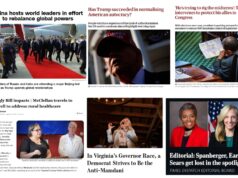The following press release is from Norfolk City Council member Andria McClellan, who announced on July 22 that she’s “exploring” a run for Lt. Governor of Virginia in 2021. Note that the climate change policy group chaired by Andria McClellan also includes Del. Mark Keam (D-Fairfax) as one of its “contributing elected officials.” The main goals listed in this report include: “rapidly and dramatically slash[ing] greenhouse gas emissions”; making sure that environmental justice is “central to decision making in order to protect vulnerable populations, equitably share the benefits of reducing emissions, and address legacy pollution”; “Requiring utilities to sell the highest percentage of clean energy as possible under clean energy standard.”
No doubt, the Virginia Clean Economy Act (VCEA) – signed into law by Gov. Northam in April, and in effect since July 1 – gets us part of the way to where we need to be, but to get *all* of the way, we’re going to have to VCEA as a “floor” not a “ceiling,” and really build on it in 2021 and beyond. Fortunately, clean energy prices have plummeted, to the point where they are increasingly out-competing fossil fuels on cost alone, even without accounting for fossil fuel’s massive “negative externalities” (pollution, health costs, etc.). In sum, moving to a 100% clean energy economy as rapidly as possible has now moved into the “no-brainer” category, with really no good reason(s) not to do so. Unfortunately, thanks to the fossil fuel industry delaying necessary climate action by several decades, we are now going to haul ass, whether at the local, state or federal levels. This November and beyond, let’s elect people who believe in science (and economics) and get moving!
Councilwoman McClellan Releases New Climate Change Agenda
McClellan is co-chair of a national group that has released a state and local policy report; recommendations urge cities to emulate Norfolk’s efforts around resiliency and sea level rise
Washington, DC – A new set of extensive recommendations for state and local officials across the country to address the threats of climate change has been released by a national group co-chaired by Norfolk Councilwoman Andria McClellan. In Policy Proposals for Growing a Clean Economy and Protecting Communities, the NewDEAL Forum Climate Change Policy Group provides a guide for building a safer, healthier, and more prosperous future, with a special focus on environmental justice.
The report highlights Norfolk’s efforts to deal with increased flooding, calling the city “a bold model for how to live with the water.” Among its key strategies around resilience, the report calls for cities to update zoning laws, provide creative funding mechanisms to help property owners finance resiliency improvements, and invest in green infrastructure.
Emphasizing the essential role of leadership from outside Washington, the Group’s recommendations also urge states and cities to pursue: 100 percent clean electricity; ambitious efforts to retrofit and electrify buildings; stronger fuel efficiency standards that end emissions from new trucks and are in line with Obama-era goals of about 54 miles/gallon by 2025; carbon pricing; and ending fossil fuel subsidies.
Overall, the report includes a range of transformative and incremental solutions, drawn from the work of innovative policymakers, as well as input from leading think tanks and members of the private sector. Key strategies to address the impacts of climate change are accompanied by dozens of model programs, laws, and pieces of proposed legislation from across the country.
View the full recommendations here.
The group was co-chaired by Councilwoman McClellan, as well as Wisconsin Lieutenant Governor Mandela Barnes, who worked with elected officials across the country, as well as experts from outside government to develop practical solutions for state and local officials to pursue.
“Forward-thinking leaders across the nation, many of whom partner with us as members of the NewDEAL network, along with concerned citizens, have shown that solutions exist to cut emissions and protect against climate change,” write Barnes and McClellan in the report. “They have built a blueprint for the kind of climate leadership needed to tackle an immense, planetary problem. This report gathers what they’ve learned. It pairs policy recommendations with real-life examples and best practices.”
Acknowledging the lack of national leadership during the past four years, the report stresses that a “better, safer future isn’t just possible — it’s already happening in cities and states across America,” where “leaders have stepped in to set ambitious clean energy goals, expand solar access to low-income residents, clean up transportation, make polluters pay, and build greener, more energy-efficient cityscapes.”
Policy Agenda Summary
Recommendations focus on three key areas outlined below, with each section emphasizing the importance of environmental justice and of leaders recognizing the hugely disproportionate impacts that a changing climate, and the pollution that causes it, have long had on communities of color. The report makes clear that effects on these communities must be examined when crafting climate policies.
Reducing Emissions: To help the United States reach the vital goal of cutting emissions in half by 2030 and reaching zero new emissions by 2050, the Climate Policy Group recommends policies around: cleaner electricity, including requirements for utilities and grid modernization; smarter buildings through strict energy efficiency standards and retrofitting investments; smarter transportation through electric vehicle infrastructure and support for stronger national and state-level fuel efficiency standards; and investments in innovative technologies, such as advanced nuclear and carbon capture.
The report also highlights the importance of continuing the push to put a price on carbon to make polluters pay and generate resources for clean investments.
Building Resiliency: To protect communities from the inevitabilities of extreme weather, the report addresses options for financing resiliency projects, equitable planning that recognizes the substantial needs of traditionally disadvantaged communities, and specific steps to deal with flooding, wildfires, and extreme heat. It calls for resiliency-focused infrastructure banks, more green space, new zoning laws, and fire-resistant building materials.
Fostering Widespread Support: The final section of the report deals with keys for leaders to rally their communities around solutions, with recommendations around: investing in the transition to a cleaner economy, including jobs and training for workers to transition to better-paying employment; making environmental justice a cornerstone of the response to climate change; and engaging diverse constituents around common goals. It calls for enshrining in law consideration of the impact on vulnerable communities in the development, implementation, and enforcement of laws and policies.
About the NewDEAL Forum
The NewDEAL Forum is a non-profit organization which identifies and promotes innovative, future-oriented state and local pro-growth progressive policies that can improve the lives of all Americans. By facilitating the identification and spread of policy ideas, the NewDEAL Forum seeks to foster economic growth, reduce barriers to opportunity and promote good government in communities and states. The Forum advances its mission by researching, identifying, and sharing state and local pro-growth progressive policy ideas and bringing together public, private, and non-profit sector policy experts to exchange ideas and discuss the country’s biggest challenges.
###



![Monday News: Trump’s Lunacy Pushes China, Russia, India, etc. Together; “Happy Labor Day. Donald Trump and Elon Musk Are Screwing Workers.”; “Where is the [media’s] intense focus on Trump’s failing health?”; ““Trump says he is not a dictator. Isn’t he?”](https://bluevirginia.us/wp-content/uploads/2025/09/montage0901-238x178.jpg)










![Monday News: Trump’s Lunacy Pushes China, Russia, India, etc. Together; “Happy Labor Day. Donald Trump and Elon Musk Are Screwing Workers.”; “Where is the [media’s] intense focus on Trump’s failing health?”; ““Trump says he is not a dictator. Isn’t he?”](https://bluevirginia.us/wp-content/uploads/2025/09/montage0901-100x75.jpg)